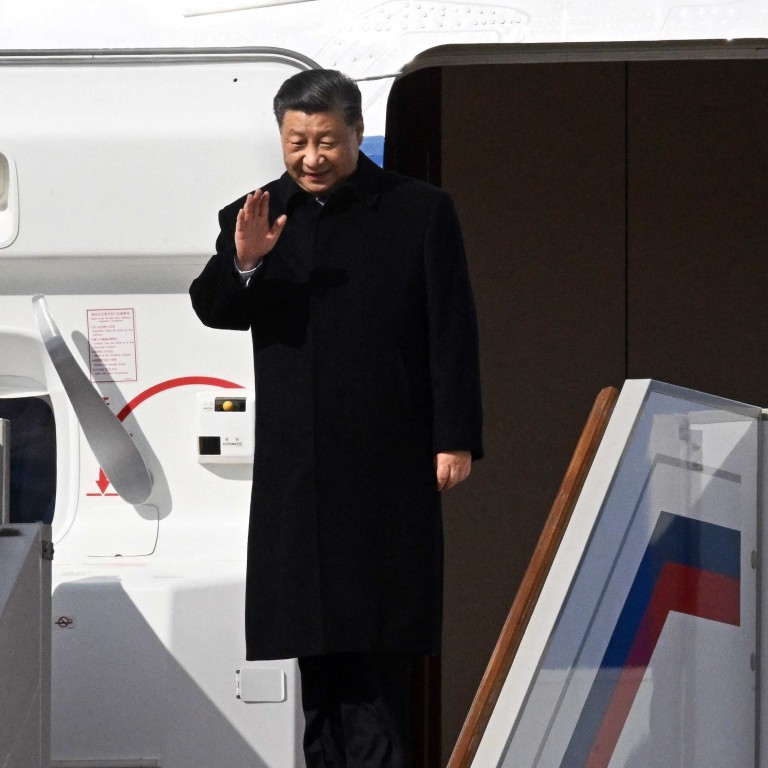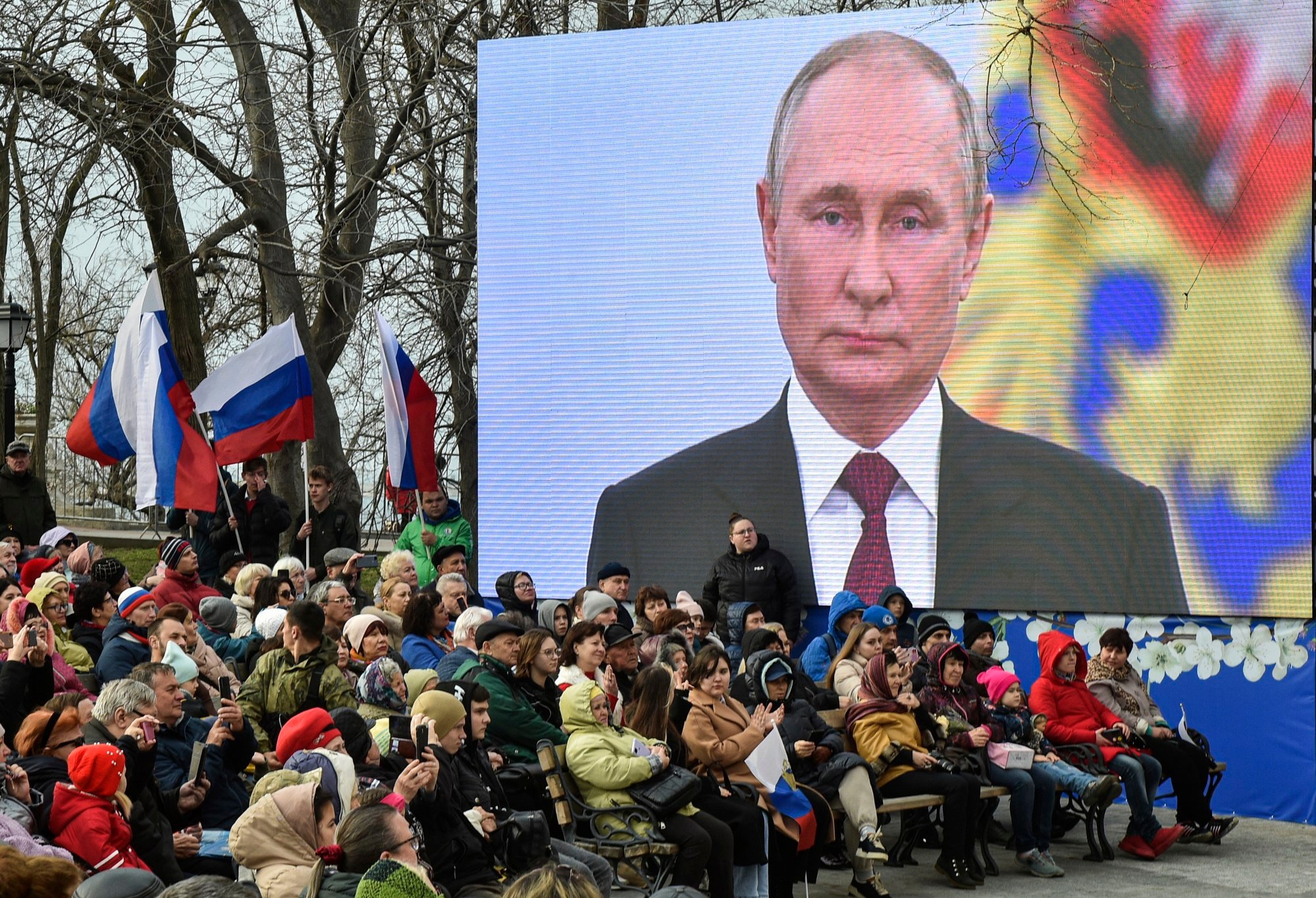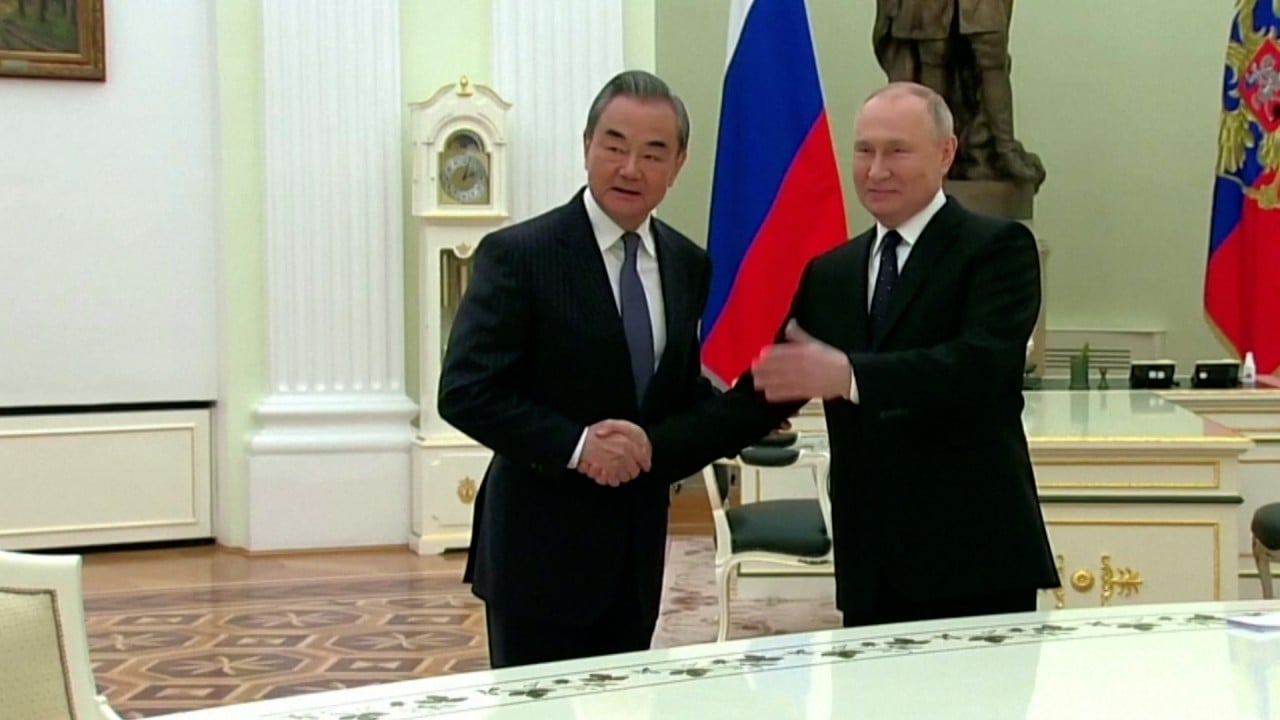
Chinese President Xi Jinping says visit to Russia will be a ‘fruitful’ one
- Xi arrived in Moscow on Monday, becoming the first major leader to visit since Vladimir Putin invaded Ukraine last year
- Putin, who was recently indicted for war crimes, used an article in Chinese state media to attack the ‘collective West’ for trying to contain Russia and China
After landing at Moscow’s Vnukovo International Airport at about 1pm local time on Monday, Xi said he would have “an in-depth exchange of views on bilateral relations and major international and regional issues of common concern” during his meetings with his Russian counterpart Vladimir Putin.
“I am confident that the visit will yield fruitful results and give new impetus to the healthy and stable development of the comprehensive strategic partnership of cooperation between China and Russia in the new era,” Xi said, according to a transcript published by state broadcaster CCTV.
He also hailed the deepening ties between the two neighbours, which he said were “not aligned, not confrontational and not targeting third parties”.
As permanent members of the UN Security Council, China and Russia have played significant roles in global affairs, Xi added.
“In the face of a turbulent and changing world, China is ready to continue to work with the Russian side … to push forward a multipolarity and … promote the development of global governance in a more just and reasonable direction”, he said.
This is Xi’s ninth visit to Russia as Chinese leader and his first overseas trip since beginning his groundbreaking third term earlier this month.
He is also the first leader from a major power to visit Moscow since Putin ordered the invasion of Ukraine more than a year ago, triggering one of the most serious geopolitical crises since the Second World War.
“There are no simple solutions to complex problems,” he wrote, according to a Chinese version of the article released by state news agency Xinhua late on Sunday night.
“We believe that as long as all parties uphold a common, comprehensive, cooperative and sustainable concept of security, and adhere to equal, rational and pragmatic dialogue and consultation, we will certainly find a reasonable way to resolve the crisis in Ukraine and a bright way to achieve lasting peace and universal security in the world.”
Could Chinese President Xi Jinping’s Russia trip help to end war in Ukraine?
Putin used much stronger wording in an article published hours before Xi’s by the Chinese Communist Party’s newspaper People’s Daily.
“The ‘collective West’ is struggling more … desperate to cling to old dogmas and to its ever-losing dominance, even to the extent of ‘gambling’ on the fate of some countries and peoples,” he wrote.
“The US strategy of double containment of Russia and China, in an attempt to contain any country that does not submit to US dictates, is becoming more … rampant. The architecture of international security and cooperation is being dismantled.”
Beijing has said the trip would be “a journey of friendship, cooperation and peace”, and that the two neighbours would continue to work together to improve mutual trust, boost people-to-people exchange and expand bilateral trade, which exceeded US$190 billion last year, up by 116 per cent from 10 years ago.
Beijing’s “no-limits” partnership with Moscow – announced just weeks before the invasion of Ukraine – has come under scrutiny by the West, unhappy with China’s reluctance to join sanctions against Russia.
With China and the US locked in a bitter confrontation over everything from ideology to technology, Western countries are becoming increasingly alert for signs that Beijing may step up its support – politically, financially or even militarily – for Moscow to counter the West.
Details of Xi’s trip in Moscow have yet to be released, but according to Putin aide Yuri Ushakov, the two leaders are expected to sign a joint statement on a plan to develop economic cooperation to the year 2030, as well as a joint document on deepening their comprehensive partnership and strategic interaction between the two countries.
In Moscow, Dmitri Peskov, the Kremlin’s spokesman, told reporters on Monday that the two leaders would have an “informal but very important” meeting on Monday afternoon, and issues including the Ukraine war would be high on the agenda. The two leaders will have a working dinner after that.
China-Russia relationship is important for the world, says ambassador
On Tuesday the Chinese leader will have a separate meeting with the Russian Prime Minister Mikhail Mishustin. A series of ministerial meetings will also take place involving senior officials from foreign affairs, defence, central banks, energy, finance, transport and national security.
The heads of Rosatom – the Russian state atomic energy company – and Russia’s ministry of military-technical cooperation, will meet with their Chinese counterparts.
Ushakov said the two leaders would exchange “not too expensive, but symbolic” presents, and talks would include discussions on “the most sensitive issues”.
Nearly a dozen “important” deals are expected to be signed after the meetings, according to the Sputnik news agency.
‘Sunday is the busiest’: why more Russians are learning Chinese
In its first position paper on the Ukraine war, released in February, Beijing advocated for an immediate ceasefire and an end to sanctions but stopped short of saying how exactly Beijing could mediate between Moscow and Kyiv.
Without naming the US or the West, Xi said global development was “deeply harmed by hegemony and bullying” in his latest article.
“The international community is well aware that there is no superior country in the world, no one-size-fits-all model of national governance, and no international order in which one country has the final say,” he wrote.

In his article, Putin welcomed Beijing’s “constructive role” in resolving the Ukrainian conflict, while blaming the West for stirring up conflicts in Ukraine and potentially in the Asia-Pacific region.
“It is obvious that there are forces persistently working to split the common Eurasian space into a network of ‘exclusive clubs’ and military blocs that would serve to contain our countries’ development and harm their interests. This won’t work.”
Putin referred to Xi as “my good old friend with whom we enjoy the warmest friendship”, and said the talks would “give a new powerful impetus to our bilateral cooperation in its entirety”.
China hints at ‘safe and credible’ currency cooperation with Russia
“It is noteworthy that the share of settlements in national currencies in our mutual trade is growing, further strengthening the sovereignty of our relations,” he said.
Xi’s three-day visit to Moscow comes as tensions between Russia and the West continue to escalate.
On Friday, the International Criminal Court issued an arrest warrant for Putin, who is accused of war crimes linked to the forced deportation of children from Russian-occupied areas of Ukraine.
Will Russia’s Vladimir Putin really ever be arrested?
This was the first time such a warrant was issued for a leader of a major power, and Moscow said it would not recognise the jurisdiction of the ICC, describing its decision as “null and void”.
Putin appeared undeterred, visiting the occupied Ukrainian port city of Mariupol late on Saturday night, one day after he visited Crimea, occupied by Russia since 2014.
Asked if the ICC’s ruling would affect Xi’s visit to Russia, Chinese foreign ministry spokesman Wang Wenbin said on Monday that the international community should play a constructive role to facilitate peace talks and conflict mediation.
“The ICC should uphold an objective and impartial position, respect the jurisdictional immunity enjoyed by heads of state under international law, and should … apply international law in good faith, and avoid politicisation and double standards,” he said.


